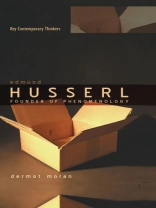Dermot Moran provides a lucid, engaging, and critical introduction
to Edmund Husserl’s philosophy, with specific emphasis on his
development of phenomenology. This book is a comprehensive guide to
Husserl’s thought from its origins in nineteenth-century
concerns with the nature of scientific knowledge and with
psychologism, through his breakthrough discovery of phenomenology
and his elucidation of the phenomenological method, to the late
analyses of culture and the life-world. Husserl’s complex ideas are
presented in a clear and expert manner. Individual chapters explore
Husserl’s key texts including Philosophy of Arithmetic,
Logical Investigations, Ideas I, Cartesian
Meditations and Crisis of the European Sciences. In
addition, Moran offers penetrating criticisms and evaluations of
Husserl’s achievement, including the contribution of his
phenomenology to current philosophical debates concerning
consciousness and the mind.
Edmund Husserl is an invaluable guide to understanding
the thought of one of the seminal thinkers of the twentieth
century. It will be helpful to students of contemporary philosophy,
and to those interested in scientific, literary and cultural
studies on the European continent.
Spis treści
Acknowledgements.
Abbreviations.
Introduction.
Chapter One: Edmund Husserl (1859-1938): Life and Writings.
Chapter Two: Husserl’s Conception of Philosophy.
Chapter Three: The Philosophy of Arithmetic (1891).
Chapter Four: Husserl’s 'Breakthrough Work’: Logical
Investigations (1900/1901).
Chapter Five: The Eidetic Phenomenology of Consciousness.
Chapter Six: Husserl’s Transcendental.
Phenomenology: An Infinite Project.
Chapter Seven: The Ego, Embodiment, Otherness,
Intersubjectivity, and the 'Community of Monads’.
Chapter Eight: Conclusion: Husserl’s Contribution to
Philosophy.
Notes.
Bibliography.
Index
O autorze
Dermot Moran is Professor of Philosophy at University College Dublin and author of Introduction to Phenomenology (2000) among other workds.












